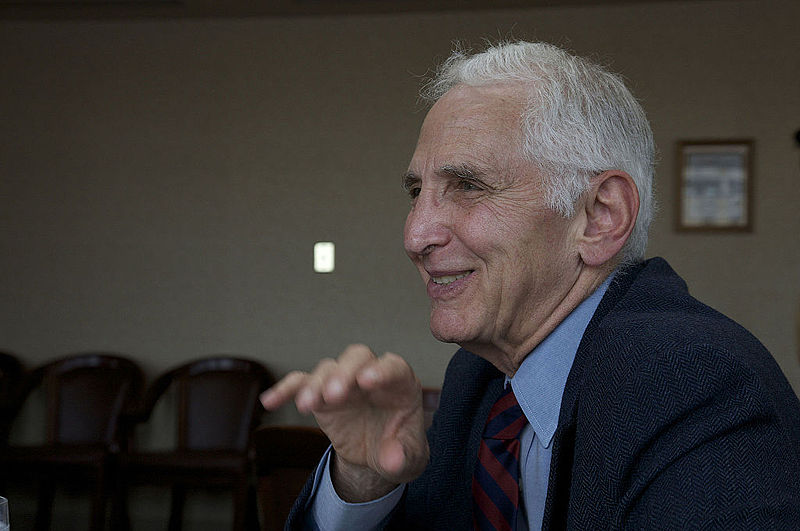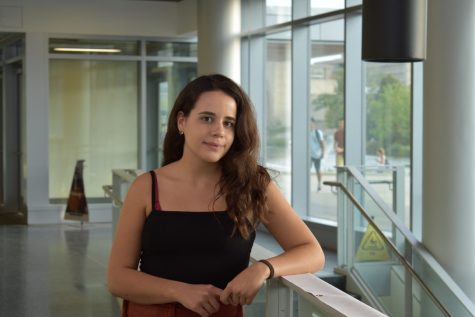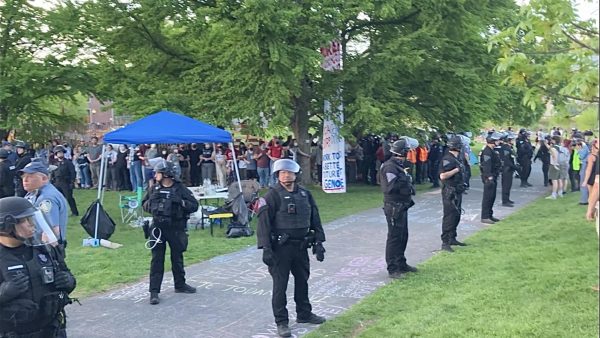UMass acquires collection of Daniel Ellsberg; upcoming talk with the activist and whistleblower
AMHERST — To tell or not tell, to do or not do.
Over the last month, whistleblowers have made countless headlines as it relates to President Donald Trump’s Ukraine scandal. Many want a word in with Daniel Ellsberg, one of the nation’s foremost political activists and whistleblowers. He is most famously noted for his decision to release the top-secret Pentagon Papers in 1971.
The University of Massachusetts has acquired Ellsberg’s historic life’s work just a few weeks before his talk at the campus center auditorium on Wednesday, Oct. 30.
Ellsberg is a former high-level government official whose decision to release the Pentagon Papers exposed decades of deceit by American policymakers during the Vietnam War. Since, he has worked heavily in opposition of nuclear weaponry, which will be the focus of his talk in the Campus Center Auditorium later this month.
According to a press release from UMass News and Media Relations, the work of Ellsberg, 88, will be stored in a collection of papers, annotated books and photographs. The work will be available to the public by Special Collections and University Archives at the W.E.B Du Bois Library.
“In my years of service, both inside government and out, I have always firmly believed that truth-telling to the American public is an expression of the loyalty owed to the Constitution, the rule of law and the sovereign public. It is a patriotic and effective way to serve our country,” Ellsberg said in the press release. “Sharing these papers with future generations through the archives at UMass Amherst is reflective of that deeply held philosophy.”
Robert Cox, head of special collections and university archives, said the large collection will include everything from Ellsberg’s criminal trial documents, his assessments of U.S. decision-making during the Vietnam War to papers he wrote as a Harvard College student.
“It’s a very diverse collection, a very broad collection that represents pretty much his entire career,” said Cox.
A piece of the collection has already arrived at UMass, with one coming next week. Yet, he said, the processing time may take a while. According to the press release, the 500 boxes are estimated to take two years of a full-time archivist’s work to process and catalog the collection. It marks one of the university’s largest collections.
“Our archive is dedicated to social change. The focus that we have, the people that we have represented here, I think enhance Dan’s work. They fit with Dan in a very interesting way,” Cox said. He noted that if archives are not university-related, they fall under three themes: social change, innovation entrepreneurship and New England.
UMass was able to receive the collection after a faculty member of the Political Economics Resource Institute, Robert Pollin, attended a conference where he heard about the boxes sitting in Daniel Ellsberg’s basement. Pollin recognized how important that was, and worked with Cox, Ellsberg and Chancellor Subbaswamy to reach an agreement.
According to the Boston Globe, the University acquired the papers for $2.2 million, most of which ($1.35 million) was provided by an anonymous donor. The remainder of the money will come from the University’s special collections fund.
“He is a historically significant figure and I think anybody who looks at him would say that,” said Cox. He said Ellsberg had a range of knowledge through his job at the RAND Corporation, Defense Department and Department of State. He emphasizes that the decision was not made rashly, with access to many materials, experience in high-level decision making as well as the considerable amount of time he spent in Vietnam.
Recently named as Distinguished Research Fellow by the PERI, Ellsberg will participate in a panel following the viewing of the “The Most Dangerous Man in America: Daniel Ellsberg and the Pentagon Papers” on Mon. Oct.28. The following evening, he will present a lecture titled “The Dollar Auction, Unendurable Wars and Gambling with Catastrophe.”
“This collection will provide invaluable insight into his expertise in decision theory, his involvement in major chapters of American history – including the Vietnam War and Watergate – and his advocacy against war and nuclear weaponry,” said Chancellor Subaswammy in the UMass press release.
Since his trial in the early 1970s, Ellsberg has continued to be an active spokesman against nuclear weaponry. The public talk in the campus center is titled “The Ethics of Threatening Omnicide.”
“He really wants to talk about the ethical underpinnings of the government that takes a stance essentially that if we go nuclear, we will annihilate all of you,” said Cox.
Karen List, a UMass journalism professor, teaches about Ellsberg in her Journalism and Law class. She uses Ellsberg in the context of prior restraint, a form of censorship imposed usually by a government or institution to prohibit instances of expression. She said she talks about Ellsberg because he’s an excellent example of an official who gave the public classified information. She added that the information he shared was classified but was not dangerous to national security.
“It was just embarrassing to the government,” List said. “He got information to the American people about the Vietnam War that we would not have had and he risked so much to do that. He could have gone to prison for decades, but he didn’t because he said ‘if I don’t do it, who will?’ I have so much respect for that.”
List is planning on going to the Oct. 30 event and has urged her students to do the same.
“It’s an honor to have those papers,” she said.
Email Caeli at [email protected] or follow her on Twitter @caeli_chesin.











